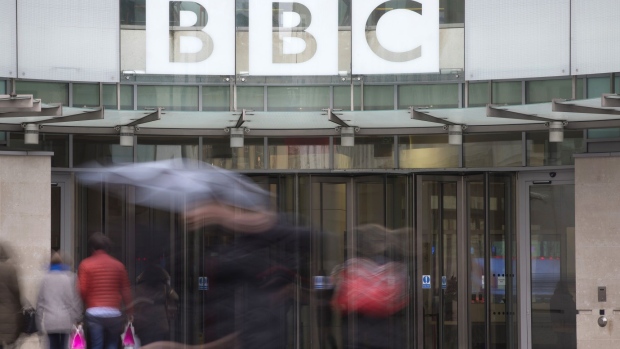Jan 17, 2022
Boris Johnson, Reeling From ‘Partygate,’ Takes Aim at BBC License Fee
, Bloomberg News

(Bloomberg) -- Boris Johnson’s government said it is freezing the fee levied on households for the British Broadcasting Corp. and announced a review into its long-term funding, a move likely to appeal to Conservative voters as the embattled prime minister tries to shore up support.
“I’ve made it clear that the BBC needs to address issues around impartiality and group think,” Culture Secretary Nadine Dorries, a long-time ally of Johnson, said in the House of Commons Monday. The review will begin “shortly” and look at whether the annual 159 pounds ($217.09) fee is “still appropriate,” she said. It will also be frozen for two years.
Johnson Ally Says BBC Funding Depends on Tackling ‘Groupthink’
Opposition lawmakers immediately questioned the timing of the announcement, describing it as “red meat” to the Tory faithful just as Johnson seeks to get his premiership back on track amid a furious public backlash over pandemic rule-breaking parties in Downing Street.
It is a safe target for Johnson, given the longstanding animosity between the Conservatives and the BBC. Many Tory politicians believe the public broadcaster known as “the beeb” -- which celebrates its 100th anniversary this year -- is favorable toward left-leaning policies and overly critical of the right.
The corporation must command “support from across the breadth of the U.K., not just the London bubble,” Dorries said.
The BBC provides multiple national and regional TV channels, national and local radio stations, a major website, the World Service and a commercial arm known as BBC Studios. Much of its funding comes from the license fee levied on everyone in the U.K. who watches live television or streams its content. Those who fail to pay can face prosecution.
Amid tensions between the government and the broadcaster in October, Johnson said in a BBC radio interview it is a “great national institution” and would be “around for a very long time.”
But Conservative members of Parliament regularly air grievances about the broadcaster: Andrew Rosindell told the Commons this month that the BBC should be playing the national anthem on television every day.
Dorries herself said on Twitter the next license fee announcement “will be the last,” implying that the government is ultimately looking to scrap the levy when the current arrangement ends.
‘Absorb inflation’
Under the government’s current plans, the license fee will remain at 159 pounds until 2024 and then rise in line with inflation for the following four years. Dorries said the freeze is necessary given the surge in living costs facing Britons.
“When it comes to monthly bills, this is one of the few direct levers that we have in our control as a government,” she said.
Freezing the fee will mean the broadcaster has to absorb inflation and that will affect programming, BBC Chairman Richard Sharp and Director General Tim Davie said in an emailed joint statement.
“That is disappointing -- not just for license fee payers, but also for the cultural industries who rely on the BBC for the important work they do across the U.K.,” they said.
Some Tories also warned the government not to go too far. Julian Knight, who chairs Parliament’s culture committee, called on the government to ensure the BBC can “compete effectively on a global stage.” Former Conservative Culture Secretary John Whittingdale said the debate on funding should be “not to undermine the BBC but to ensure it can survive going forward.”
©2022 Bloomberg L.P.





